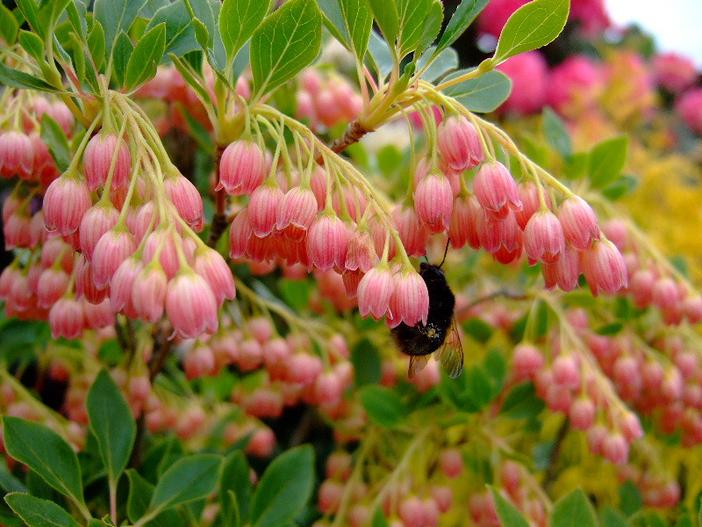Redvein Enkianthus
(Enkianthus campanulatus)
Redvein Enkianthus (Enkianthus campanulatus)
/
/

yewchan
CC BY-SA 2.0
Image By:
yewchan
Recorded By:
Copyright:
CC BY-SA 2.0
Copyright Notice:
Photo by: yewchan | License Type: CC BY-SA 2.0 | License URL: https://creativecommons.org/licenses/by-sa/2.0/ | Uploader: yewchan | Publisher: Flickr

























































Estimated Native Range
Summary
Enkianthus campanulatus, commonly known as Redvein Enkianthus, is a deciduous shrub native to acidic, well-drained soils of mountainous forests in Japan. This species is the hardiest among the Enkianthus genus, exhibiting a medium size with a narrow and upright form. It typically reaches 6 to 10 feet in height and 4 to 6 feet in width. The shrub’s foliage is bright green and glossy, turning to brilliant coppery or red hues in the fall. In late spring to early summer, it produces a profusion of bell-shaped, creamy white flowers with distinctive red veins, which are particularly showy and attract pollinators.
Redvein Enkianthus is valued for its beautiful fall coloration and its unique, ornamental flowers. It is often used in parks and gardens for border planting or as a specimen plant. While it prefers acidic, well-drained soil, it is relatively low maintenance once established. It should be spaced 4 to 5 feet apart to allow for mature growth. Fertilization is recommended in spring just before new growth begins. Its cold hardiness extends down to -20 °F, making it suitable for many temperate regions. This plant has earned the Royal Horticultural Society’s Award of Garden Merit, indicating its exceptional qualities in garden settings. Potential problems include aphids and leaf spot, but these are generally not severe.CC BY-SA 4.0
Redvein Enkianthus is valued for its beautiful fall coloration and its unique, ornamental flowers. It is often used in parks and gardens for border planting or as a specimen plant. While it prefers acidic, well-drained soil, it is relatively low maintenance once established. It should be spaced 4 to 5 feet apart to allow for mature growth. Fertilization is recommended in spring just before new growth begins. Its cold hardiness extends down to -20 °F, making it suitable for many temperate regions. This plant has earned the Royal Horticultural Society’s Award of Garden Merit, indicating its exceptional qualities in garden settings. Potential problems include aphids and leaf spot, but these are generally not severe.CC BY-SA 4.0
Plant Description
- Plant Type: Shrub
- Height: 6-10 feet
- Width: 4-6 feet
- Growth Rate: Slow
- Flower Color: Cream, Orange, Pink, Red
- Flowering Season: Spring
- Leaf Retention: Deciduous
Growth Requirements
- Sun: Full Sun, Part Shade
- Water: Medium
- Drainage: Medium
Common Uses
Bee Garden, Bird Garden, Border Plant, Deer Resistant, Hummingbird Garden, Low Maintenance, Showy Flowers
Natural Habitat
Acidic, well-drained soils of mountainous forests in Japan
Other Names
Common Names: Furin-Tsutsuji, Klockbuske, FŪRin-Tsutsuji
Scientific Names: , Enkianthus campanulatus, Enkianthus campanulatus var. albiflorus, Enkianthus campanulatus f. albiflorus, Andromeda campanulata, Tritomodon campanulatus, Enkianthus recurvus, Enkianthus ferrugineus, Enkianthus kikuchi-masaoi, Enkianthus latiflorus
GBIF Accepted Name: Enkianthus campanulatus (Miq.) G.Nicholson